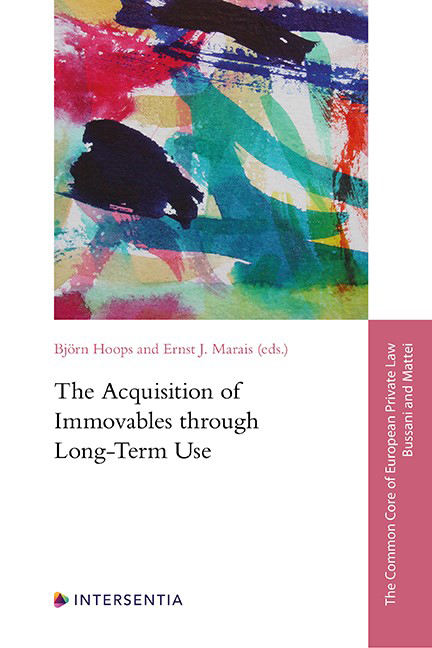Book contents
- Frontmatter
- General Editors’ Preface
- Preface
- Contents
- List of Cases
- Table of Legislation
- List of Abbreviations
- List of Contributors
- Case PART I INTRODUCTORY MATTERS
- PART II CASE STUDIES
- PART III GENERAL CONCLUSIONS
- Appendix I Instructions for the Project on the Acquisition of Immovables through Long-Term Use
- Index
Comparative Analysis – Case 10
Published online by Cambridge University Press: 26 May 2022
- Frontmatter
- General Editors’ Preface
- Preface
- Contents
- List of Cases
- Table of Legislation
- List of Abbreviations
- List of Contributors
- Case PART I INTRODUCTORY MATTERS
- PART II CASE STUDIES
- PART III GENERAL CONCLUSIONS
- Appendix I Instructions for the Project on the Acquisition of Immovables through Long-Term Use
- Index
Summary
GENERAL INTRODUCTORY AND COMPARATIVE REMARKS ON CASE 10
Case 10 concerns land owned by more than one person and addresses the issue of whether co-owners can acquire another co-owner’s share in the land through long-term use. An issue linked to this acquisition is whether the co-owner who has not used the land for a long time can claim benefits reaped by other co-owners. The jurisdictions can be divided into four groups.
(1) NO ACQUISITION OF THE CO-OWNER‘S SHARE, BUT ENTITLEMENT TO THE BENEFITS
England and Wales, Finland, Norway, Russia, Slovakia, and Sweden do not recognise the possibility of co-owners acquiring the share of another co-owner in the land. They do not allow for acquisitions by unlawful occupiers through long-term use and, therefore, preclude co-owners from acquiring the share of another co-owner. Even under the Land Registration Act of 1925, English and Welsh law did not permit co-owners to acquire another co-owner’s share because of the fiduciary duties between the co-owners and because adjusting the use of the land to the will of the majority may be reconcilable with the rights of the co-owners so that there would be no adversity in the first place. Under the laws of these jurisdictions, the excluded co-owner is also entitled to her share in the profits derived from the land during her absence, subject to a limitations period.
(2) NO ACQUISITION OF THE CO-OWNER‘S SHARE AND ALSO NO ENTITLEMENT TO THE BENEFITS
Like the first group, Alberta, Germany and Scotland do not permit co-owners to acquire another co-owner’s share. However, in contrast to the first group, this second group of jurisdictions preclude the excluded co-owner from claiming her share in the profits. The difference between the first and the second group may be the result of the diverging entitlements of co-owners, in particular whether each co-owner may use the whole of the land, and of diverging answers to the question of whether it is each co-owner’s own responsibility to use the land or to secure profits from the land in another way
- Type
- Chapter
- Information
- The Acquisition of Immovables through Long-Term Use , pp. 675 - 676Publisher: IntersentiaPrint publication year: 2022



